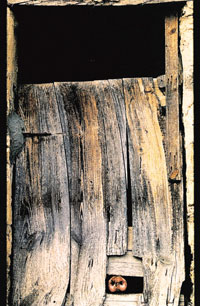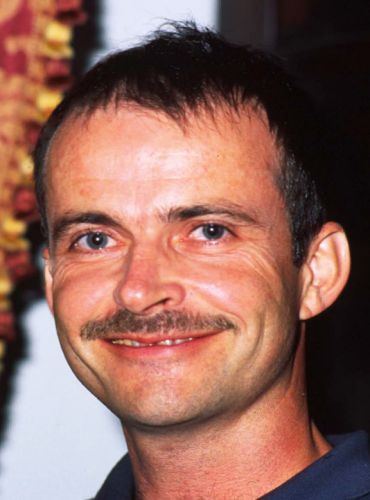Party hostess, history buff, English teacher, journalist, translator, mother, ex-restaurateur, go-go dancer and maker of the most delicious chocolate-chip cookies on San Antonio Bay. If you didn't see Emily Kaufman last summer across a crowded dance-floor, chances are you attended one of her impromptu fiestas two weeks back, or were behind her yesterday in the queue at the library. Or that your son/daughter is over at her place right now listening to hard rock and eating a hot dog with guacomale.
Let us drop in on that pad overlooking the famous bay, with Cap Nunó poking its unlikely summit into the evening sky - a menacing grey, just for a change. The apartment is cosy, 'lived-in' if you like, but somehow an unlikely residence for a bibliomaniac: true, there are books aplenty, but they are squirreled away behind candles, family snaps, mauve cushions and masses of board games. Emily herself seems to spend most of her time in the kitchen (she opens the door wearing an old-fashioned apron), preparing vegetarian meals and teatime treats for her two teenage sons and a never-ending troupe of visitors. When, you ask yourself, does she ever find time to write?
Ignoring the constant summons from the doorbell, you sit down with a bottle of tinto and a delicious bean-and-cheese dip (the computer has completely taken over the rest of the dining-table) to ferret out a few answers. The first clue turns out to be her name, which her mother bestowed out of a deep love for Emily Dickinson (1830-86), one of America's leading nature poets. To be called after a perennially popular wordsmith is an auspicious beginning indeed for a writer. Turning to the surname, her father was actually a buyer (Kaufmann in German), who was so successful that he rose to become vice-president of the national company for which he worked. Emily, an only child, was born overlooking the East River and although the family moved to Pennsylvania when she was six, remains at heart a native New Yorker. After Ibiza, that is.
From New York - to York, Pennsylvania, the region known thanks to the film Witness as 'Amish Country'. But also to a town with inspiring pedagogues: "I loved school," Emily confesses, as if it weren't quite the done thing. "I thought every single subject was utterly fascinating - except Math - and as soon as I got home would rush upstairs to get down to my homework." Three very different history teachers fostered a deep love of the humanities as well as original ways of imparting information, lessons which have served Emily well in her professional life. Pennsylvania also provided an enduring appreciation of simpler values summed up in the phrase 'Mom and apple-pie': home, treasured family objects, kitchen and friends. Books (especially dictionaries) hold an honoured place but there is no television whatsoever - just like those spotless Amish farmhouses where Harrison Ford went to ground.
Back to our c.v., young Miss Kaufman was not exactly Wolfgang Amadeus when it came to history and at Washington College, she put the subject firmly on the back-burner in order to forge ahead in literature, art history, film studies, languages and social skills. A better comparison would perhaps be Pyotr Ilyich Tchaikovsky, whose early grounding in other disciplines allowed him later on to completely steal the hearts and minds of his audience. At college another inspiring teacher provided important lessons about art and literature: a film would never be watched once, but three times, each occasion sounding a deeper level of craft and content. Rigorous analysis, a methodology allowing her to plumb the vital depths of a film or book, can now be seen in Emily's thorough reworking of raw historical data to arrive at a fresh understanding of the past.
In American colleges it is customary to take a Junior Year Abroad, and as Emily was studying French and Spanish, the choice was either Paris or Madrid. "Against all expectations" (modesty is one of her most engaging traits) an application to the prestigious Middlebury College in Vermont was successful, and eleven months in 1980-81 were spent at Madrid's Instituto Miguel Ángel. The Old World, and especially Spain, came as a complete revelation: she sighed with the Moors of the Alhambra, dreamt with the spires of Salamanca and Oxford and fell hopelessly in love with the architecture, the ever-present history and a handsome Madrileño.
After wedding bells and a classic Balearic honeymoon (passing little Ibiza by - there was neither time nor money) the couple settled down to work in the Spanish capital. Emily taught English and became a mother, but within a few years was feeling a pressing need to reacquaint herself with the salty Mediterranean air. When a faint possibility of work in Ibiza presented itself in 1984, she urged her husband to pursue it and against all odds, fortune again smiled: the little family found itself for the first time gazing out on the miraculous bay of San Antonio.
We have been neglecting a key player in our story: re-enter Betty Kaufman from Alabama and Tennessee, onetime actress, passionate reader, history buff par excellence - and mother of Emily. She had flown over to help with the move, and before flying back to Pennsylvania decided that now was the time to take her daughter's knowledge of ancient history in hand. Emily recalls the day she told her mother over the phone about the move to Ibiza. Mrs Kaufman (with no hesitation): "Ibitsia? You know they have the largest Punic necropolis in the entire Mediterranean?" Emily hadn't the faintest idea what she was talking about, but both 'Punic' and 'necropolis' sounded intriguing. When her mother added the Carthaginians for good measure, she was completely floored: 'But we never studied them,' was all she could wail into the receiver.
So one fine day in San Antonio Betty Kaufman announced a joint visit to Dalt Vila. "We have to see the walled city," she explained. Off the pair went and within a short time Emily found herself standing before Charles V's and Calvi's magnificent ramparts, transfixed to the ground. It was the first time she had set eyes on anything like it, a revelation - an epiphany. There and then she made a solemn resolve to get to the bottom of the breath-taking monument - and of the history of the island on which it had been erected.
Nearly eight years were to pass before she could embark properly on her mission. The first step was when she was headhunted in 1989 by the first editor of IbizaNOW, Sally Wilson. The two were sitting in a travel agency and it was their eyes which smiled, the start of a lasting friendship, personal as well as professional. The latter was transferred a few years later to Don and Gisela Andrews when they took over the editorial reins in Santa Eulalia. Emily soon graduated from cub reporter to one of the monthly's core contributors, but when she started up a vegetarian café in San Antonio, it became difficult to juggle the journalistic career with her culinary one. The year was 1992, five hundred years after Columbus sighted the New World, and the merry month was May. "If I have to write this blasted thing," she said in a frank outburst to the editor as the monthly deadline loomed "I may as well write about something I really like and that's history." Ever unflappable, Don Andrews replied, "Well, go ahead and do it." Thus was born The History Buff's Guide to Ibiza.
Ten years, a hundred articles and two books later (the English original of 2000 and the German translation the following year), Emily is still hard at work uncovering the island's past. In addition she has also penned about fifty history articles for Ibiza History Culture over the past year and is also beavering away as an English teacher and translator. We won't even mention those mouth-watering cookies. Ever eager to give others credit for her original talents and hard work, she feels she owes a special debt to island historian Joan Marí Cardona, who died a few months ago. He took her on as a 'tutorial student' when she was not sure exactly where to turn, and gave generously of both time and expertise. What Emily fails to mention is that the highly-respected Ibicenco scholar could hardly have had a better interpreter. Every historian worth his salt knows that it is one thing to have the facts at your fingertips, another to be able to pass them on to others. This is Emily's particular forte, and the thing she owes partly to her mother's love of neglected historical byways, and partly to the broad spectrum of subjects and writing techniques she studied at university.
But there are other aspects to her professional success. Excellence at languages is a key factor for all historians, and Emily's fluency in Castilian has undoubtedly helped win friends in diverse fields of local investigation. To this has been added her special blend of Pennsylvanian and Southern charm with the result that carefully-guarded secrets are never held back - be they the latest archaeological finds or the sort of arcane knowledge which can only be gleaned from months' - or years' - service in dusty archives. Many of these investigators - archaeologists and historians - are only vaguely familiar with Emily's output, as there is a sort of invisible 'velvet (or ivory?) curtain' between the Spanish/Catalan and English (and German) writers on Ibiza and Formentera. The former are not so bothered about passing on secrets to the latter if they are only to be revealed to an audience on the other side of the cultural divide. She is particularly scrupulous about crediting her sources, a thoughtful detalle backed up by a continuous stream of festive treats - home-baked and liquid.
Emily tells a revealing story about a high school 'essay' on Martin Luther - the Augustinian monk who started the Reformation by nailing ninety-five theses against papal indulgences onto the door of the Wittenberg Schlosskirche. Perhaps it was an inherited dramatic gift, or maybe a realization that history must somehow be made to come alive, but whatever the case, she handed in not a written document, but a cassette tape - a one-person re-enactment of Luther's religious revolution. The teacher recognized star quality when he saw (and heard) it, and awarded the assignment a rare 'A'. It was, after all, a fresh, original and totally unorthodox treatment of a fairly hackneyed topic. I am sure that most, if not all, her grateful readers, be they on Ibiza or far beyond its shores, would give the very same mark to all her output.
Back in two weeks with more Ibiza book lore. My thanks to Emily Kaufman for having a month's leave from her regular column and also for giving me carte blanche while she was away; and to Gary Hardy for being an editor in a million. History buffs rest assured that Emily will be back in her usual slot next week.
Martin Davies
martindavies@ibizahistoryculture.com

